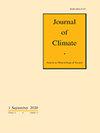Impact of ENSO and trends on the distribution of North American wintertime daily temperature
IF 4
2区 地球科学
Q1 METEOROLOGY & ATMOSPHERIC SCIENCES
引用次数: 0
Abstract
Abstract The effect of the El Niño/Southern Oscillation (ENSO) teleconnection and climate change trends on observed North American wintertime daily 2-m temperature is investigated for 1960–2022 with a quantile regression model, which represents the variability of the full distribution of daily temperature, including extremes and changes in spread. Climate change trends are included as a predictor in the regression model to avoid the potentially confounding effect on ENSO teleconnections. Based on prior evidence of asymmetric impacts from El Niño and La Niña, the ENSO response is taken to be piecewise linear, and the regression model contains separate predictors for warm and cool ENSO. The relationship between these predictors and shifts in median, interquartile range, skewness, and kurtosis of daily 2-m temperature are summarized through Legendre polynomials. Warm ENSO conditions result in significant warming shifts in the median and contraction of the interquartile range in central-northern North America, while no opposite effect is found for cool ENSO conditions in this region. In the southern U.S., cool ENSO conditions produce a warming shift in the median, while warm ENSO has little impact on the median, but contracts the interquartile range. Climate change trends are present as a near-uniform warming in the median and across quantiles and have no discernable impact on interquartile range or higher-order moments. Trends and ENSO together explain a substantial fraction of the interannual variability of daily temperature distribution shifts across much of North America and, to a lesser extent, changes of the interquartile range.厄尔尼诺/南方涛动和趋势对北美冬季日气温分布的影响
摘要 采用量子回归模型,研究了 1960-2022 年厄尔尼诺/南方涛动(ENSO)远程联系和气候变化趋势对观测到的北美冬季每日 2 米气温的影响。在回归模型中将气候变化趋势作为预测因子,以避免对厄尔尼诺/南方涛动远缘关系的潜在混淆影响。根据之前关于厄尔尼诺和拉尼娜非对称影响的证据,厄尔尼诺/南方涛动的响应被认为是片断线性的,回归模型包含了暖厄尔尼诺/南方涛动和冷厄尔尼诺/南方涛动的单独预测因子。这些预测因子与日 2 米气温的中位数、四分位距、偏度和峰度之间的关系通过 Legendre 多项式进行了总结。在北美洲中北部,厄尔尼诺/南方涛动暖流条件导致中位数显著变暖和四分位数间距缩小,而在该地区厄尔尼诺/南方涛动冷流条件下则没有发现相反的影响。在美国南部,冷厄尔尼诺/南方涛动条件会导致中位数变暖,而暖厄尔尼诺/南方涛动对中位数影响不大,但会收缩四分位数之间的范围。气候变化趋势表现为中位数和各量级近乎均匀的变暖,对四分位距或高阶矩没有明显影响。气候变化趋势和厄尔尼诺/南方涛动共同解释了北美大部分地区日气温分布变化的大部分年际变化,并在较小程度上解释了四分位数区间的变化。
本文章由计算机程序翻译,如有差异,请以英文原文为准。
求助全文
约1分钟内获得全文
求助全文
来源期刊

Journal of Climate
地学-气象与大气科学
CiteScore
9.30
自引率
14.30%
发文量
490
审稿时长
7.5 months
期刊介绍:
The Journal of Climate (JCLI) (ISSN: 0894-8755; eISSN: 1520-0442) publishes research that advances basic understanding of the dynamics and physics of the climate system on large spatial scales, including variability of the atmosphere, oceans, land surface, and cryosphere; past, present, and projected future changes in the climate system; and climate simulation and prediction.
 求助内容:
求助内容: 应助结果提醒方式:
应助结果提醒方式:


